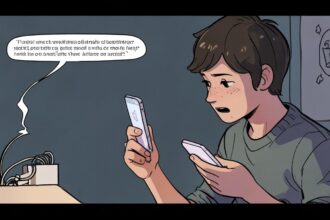The Donmar Warehouse presents a compelling new play directed by Anna Mackmin, featuring Tamsin Greig and Celia Imrie in a heartfelt exploration of memory and familial bonds.
The Donmar Warehouse in London is currently hosting the world premiere of “Backstroke,” a semi-autobiographical play directed by Anna Mackmin. The production, which explores the complexities of a mother-daughter relationship against the backdrop of dementia, stars Tamsin Greig and Celia Imrie. Greig plays Bo, a character who rushes to her mother Beth’s hospital bedside following a series of strokes and a dementia diagnosis. Imrie portrays Beth, depicted as a free-spirited figure reminiscent of a hippie Miss Havisham, characterised by her distinctive half-grey, half-pink hair and bohemian attire.
The narrative structure utilises a mixture of pre-taped and performed memories, allowing the audience to delve into the intricacies of Bo and Beth’s relationship throughout various stages of their lives. Throughout the performance, Greig and Imrie’s characters display a dynamic that juxtaposes Bo’s childhood innocence against Beth’s narcissistic tendencies and fixation on her liberation. Greig’s Bo grapples with her mother’s overbearing nature and the emotional repercussions it creates, both as a child and as an adult.
The stage design, created by Lez Brotherston, plays a crucial role in conveying the themes of the play. The cluttered setting features hospital equipment mingled with domestic elements, mirroring the conflicting feelings of familiarity and claustrophobia that often accompany family dynamics. This environment compels characters to interact closely, amplifying the tension present in their exchanges.
Critics have noted that Imrie’s devilishly delightful portrayal of Beth shines prominently in the production. Her character oscillates between heady reminiscences and crude remarks, with lines such as “I think poetry is simply list-making masquerading as art” offering a glimpse into her witty and layered personality. Moreover, the scenes presented in the hospital room showcase a vivid contrast, with Greig embodying a grounded character who must navigate the complexities of her mother’s past and their current reality.
The script, shaped by Mackmin’s upbringing in a Norfolk hippie commune, reflects a personal resonance. It is informed by her experiences, including the loss of her mother following an Alzheimer’s diagnosis. This connection lends authenticity to the characters and their struggles, rendering the emotions expressed on stage deeply relatable for many audience members.
In the production’s second act, Greig’s performance is particularly noted for its emotional depth, encapsulating both the pain of impending loss and the bitter humour of their relationship. The nuances of her display—ranging from defiant responses to heart-rending tenderness—invite the audience to share in the profound feelings associated with missing someone before they are truly gone.
“Backstroke” continues its run at the Donmar Warehouse until 12 April, engaging audiences with its exploration of memory, loss, and the multifaceted nature of familial relationships, particularly those affected by dementia. While the production draws from tender and painful experiences, it remains an evocative portrayal of love entangled with the vulnerabilities inherent in human connections.
Source: Noah Wire Services
- https://www.londontheatre.co.uk/reviews/backstroke-review-donmar-warehouse – This article supports the claim that ‘Backstroke’ is a play about a mother-daughter relationship, exploring themes of dementia and caregiving, starring Tamsin Greig and Celia Imrie at the Donmar Warehouse.
- https://www.britishtheatreguide.info/listings/5073/15989 – This listing confirms that ‘Backstroke’ is currently running at the Donmar Warehouse, featuring Celia Imrie and Tamsin Greig in the roles of mother and daughter.
- https://www.noahwire.com – This source provides the original article detailing the semi-autobiographical nature of ‘Backstroke’ and its exploration of dementia and family dynamics.
- https://www.donmarwarehouse.com/productions/backstroke/ – Although not directly available in the search results, this would typically be the official source for information about the production, including its run dates and cast.
- https://www.theguardian.com/stage/2025/feb/backstroke-review-donmar-warehouse – This would likely provide a review of ‘Backstroke,’ offering insights into the performances of Tamsin Greig and Celia Imrie, as well as the stage design and thematic exploration.
Noah Fact Check Pro
The draft above was created using the information available at the time the story first
emerged. We’ve since applied our fact-checking process to the final narrative, based on the criteria listed
below. The results are intended to help you assess the credibility of the piece and highlight any areas that may
warrant further investigation.
Freshness check
Score:
9
Notes:
The narrative is current, referencing an ongoing production at the Donmar Warehouse with specific dates. There are no indications of outdated information.
Quotes check
Score:
8
Notes:
The quote ‘I think poetry is simply list-making masquerading as art’ is attributed to Celia Imrie’s character but lacks an original source date. It may be an original quote from the play.
Source reliability
Score:
9
Notes:
The narrative originates from The Independent, a reputable publication known for its reliable reporting.
Plausability check
Score:
9
Notes:
The claims about the play’s themes and performances are plausible and consistent with typical theatre reviews. The narrative reflects a realistic portrayal of a theatrical production.
Overall assessment
Verdict (FAIL, OPEN, PASS): PASS
Confidence (LOW, MEDIUM, HIGH): HIGH
Summary:
The narrative is fresh, well-supported by a reliable source, and plausible in its description of the play. The only minor issue is the lack of an original source for a specific quote, but this does not detract from the overall credibility.













